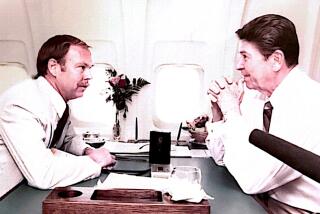Back to the Front Lines of Battle : The Gulf War Was Rough, but Retired Gen. H. Norman Schwarzkopf Faces Another Daunting Task: Making a Winner Out of His Book
- Share via
TAMPA, Fla. — After slipping into semi-seclusion for more than a year, an American hero returns to center stage today to wage one of the toughest battles of his life: Justifying the $6 million Bantam Books paid for his autobiography.
The 530-page chronicle, “It Doesn’t Take a Hero”--with a blockbuster first printing of 700,000 copies--already is in bookstores. And for the next two weeks, on a promotional tour that will take him across the United States and to England, H. Norman Schwarzkopf will return to our living rooms, on TV and radio, in newspapers and magazines, to talk about a war we seemed willing to quickly forget.
Schwarzkopf, who came home from the Persian Gulf in 1991 as the first American general to win a major war in 46 years, is mystified that the national feel-good mood of triumph faded so quickly and that critics became so obsessed with questioning the accomplishments of the 540,000 men and women he commanded in the liberation of Kuwait.
Something in the American psyche, he says, just won’t let us get too high before we start doubting the worth of our deeds.
“A lot of misinformation has crept into the lore of the war,” he says. “For instance, that business that the vast majority of the (Iraqi) Republican Guard escaped. Not true. Or that the Iraqi military had less men on the lines than we estimated. Not true. And those fantastic stories that the Patriot (missiles) performed badly. Ridiculous. They performed better than expected.
“That said, my impression is that the American people--the real American people you meet when you travel the country--are pretty darn proud of what happened in the war.”
Schwarzkopf’s book, written with Peter Petre, is intended both as the story of one soldier’s life and as a historical document of the top-level decision-making process during the 43-day Gulf War.
“To be an effective leader, you have to have a manipulative streak,” the retired four-star general writes--and the reader is left with no doubt but that Schwarzkopf knew exactly what he intended to attain from the day he entered West Point.
Given a choice of three assignments in 1988, he chose Central Command at MacDill Air Force Base in Tampa, a position that two years later would take him to the Gulf War. “Central Command,” he says, “is where you can make military history.”
The General, as everyone still calls him, returned from the war to megabuck offers that stunned him, particularly since most of his multi-starred colleagues had slipped into obscurity after retirement, lucky to pick up a position or two on corporate boards.
His father, also a distinguished general and West Point graduate, had died leaving an estate that consisted only of a $15,000 insurance policy--but the day last year that Schwarzkopf traded in his starched fatigues for a blue blazer with an American flag in the lapel, his annual military salary of $113,000 represented less than he could make giving two 45-minute speeches.
Except for five speeches a month, usually to small, select corporate groups, and two appearances on CBS specials, Schwarzkopf assumed a low profile while writing his autobiography at the million-dollar home he rents in the Cheval Polo and Golf Club, a 2,000-acre gated community in North Tampa.
On the advice of his New York literary agent, Marvin Josephson, who feared that overexposure would diminish the impact of “It Doesn’t Take a Hero,” Schwarzkopf stopped giving interviews and making public appearances until the publication of his book Friday.
“It smarts a bit when someone accuses me of cashing in on the war,” Schwarzkopf says as he sits in his spartan 12th-floor Tampa office.
“No. 1, I haven’t endorsed any product. Appearing in my underwear and sneakers with a soda can in hand doesn’t protect the dignity of our men and women who fought in the Gulf.
“No. 2, I won’t take any job in a defense-related industry.
And No. 3, I’ve turned down huge--and I mean huge--money to take advantage of my special relationship with the Arab world. But the Arabs work on a position of trust, and I’m not going to violate that trust.”
Schwarzkopf, a self-described liberal in 1964 who admired President John F. Kennedy and was uneasy when Sen. Barry Goldwater “blustered about rolling back the clock on civil rights and challenging the Soviet Union to war,” should be a walking endorsement in the 1992 election for President George Bush, whom he praises as a superb commander-in-chief.
But he has shunned requests for public support from both parties--his name was mentioned as a vice presidential candidate by the Bill Clinton and H. Ross Perot camps--and he sounds like something of a Perot backer when he talks about the importance of management and Americans’ desire for a President who will “fix” what is wrong.
“I’ve told them I’m apolitical, and I don’t want to be a political pawn,” Schwarzkopf says.
“I vote every election. Isn’t that enough? Why should I endorse anyone? The truth is, though, all too often the attitude of the people who have approached me is, ‘You’re either with us or against us.’ And I tell them, ‘Who the hell says I have to take sides?’ ”
Publishing sources estimate that Bantam will have to sell 500,000 hardback copies and 1.5 million paperbacks of Schwarzkopf’s book to recoup its investment. A substantial amount already has been earned, with rights sold in 15 countries and pre-publication excerpts running in selected newspapers and magazines from Saudi Arabia and Israel to the United States. More than 250 booksellers have invited Schwarzkopf to sign his autobiography at their stores.
But in a country where six of 10 households did not purchase a single book last year and where the biggest category of book buyers is 65 and older, predicting what will sell is risky business.
For every Lee A. Iacocca autobiography (2.6 million copies sold in hardback) or Chuck Yeager life story (1.1 million), there is a bomb like Ronald Reagan’s memoirs, which Simon & Schuster paid $7 million for along with a collection of his speeches, only to find that the nostalgia it thought would sell the book had evaporated.
Bantam is betting that Schwarzkopf--son of a famous father and an alcoholic mother, two-tour Vietnam hero, leader of ground forces in the invasion of Grenada, lifelong student of Arab culture--has a story to tell that elucidates, and transcends, the Gulf War. Among Schwarzkopf’s revelations on the war:
* After Scud missiles were fired on Tel Aviv, Israel wanted to unleash a major air attack on Iraq, and the U.S. Joint Staff suggested putting Israeli planners in Schwarzkopf’s Saudi Arabian headquarters. Israel backed off when the United States agreed to bomb Iraqi targets on a list supplied by Israel. Many of the targets turned out to be nothing more than sand dunes.
* Schwarzkopf was pressured by “White House hawks” to start the ground war ahead of schedule, even though the general said moving up the date could led to additional allied casualties. The debate over the start of the ground war led to a shouting match between himself and Gen. Colin. L. Powell, chairman of the Joint Chiefs of Staff, with Powell accusing him of showboating in front of his officers.
* The CIA’s intelligence was less valuable to Central Command than what was provided by other sources.
“In many cases, its information was so waffled you could have drawn any conclusion you wanted,” Schwarzkopf says. He cited an outdated briefing that William C. Webster, the CIA director, gave at the White House and a blurry psychological profile of Iraqi leader Saddam Hussein provided during the war.
* The staff of Defense Secretary Dick Cheney came back from a trip to Russia with its own battle plan. It was “as bad as it could possibly be,” Schwarzkopf says. Among the ideas Cheney’s staff advanced was a bizarre one to capture a remote town in western Iraq and offer it to Saddam in exchange for Kuwait.
* Saudi Arabia remained skittish and, in some cases, ill-prepared for war even as the allied buildup was under way.
At one point, the Saudi commander suggested launching the war from Turkey, not Saudi Arabia, and Saudi commanders were unwilling to place sandbags around their military installations for fear of scaring the population.
One commander complained that 24 of his battalion’s 28 U.S.-made M-60 tanks were inoperable and accused the United States of selling the kingdom defective equipment. The only problem, it turned out, was that the Saudis had not changed the air filters.
Readers expecting to find a gossipy book with acrimonious comments about inept commanders and vindictive barbs about political meddling may be disappointed: Schwarzkopf has few harsh words and usually doesn’t identify by name those who didn’t meet his expectations.
Maybe that’s because, after winning a war so decisively and becoming one of the most recognizable men in America, he simply has no ax to grind.
More to Read
Sign up for our Book Club newsletter
Get the latest news, events and more from the Los Angeles Times Book Club, and help us get L.A. reading and talking.
You may occasionally receive promotional content from the Los Angeles Times.










